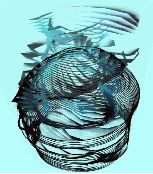audiovisual interactive improvisation for violin and computer system
by Se-Lien Chuang / Andreas Weixler
 © Chuang Se-Lien
© Chuang Se-Lien © Chuang Se-Lien
© Chuang Se-LienTodd Reynolds, violin
The sounds of live instruments serve as interface in
an audiovisual interactive concert that merges a sophisticated
instrumental sound and audiovisual real-time computing in an
improvisation. While visual images and processes are being generated
during the concert, a multi channel granular synthesis fits together
minute tonal particles that make up the instrumental sounds into a
constantly changing acoustic stream made up of different pitches,
duration and positions in the electro-acoustic space. The musical and
visual components interact and reciprocally influence each other in
order to blend into a unique, synaesthetic, improvisational work of
art.

Andreas Weixler: multi channel granular synthesis
by processing the instrumental sound in realtime the
computer becomes a hyper instrument played in an improvisation along
with the violin, spreading its sound on a 8 channel sound system,
controlling flocks of grains, rearranging those in terms of pitch,
time, order and position in the acoustic environment.
Melodic lines in horizontal time ordering will be replayed in a
vertical form of chords, which are determined by the original performed
notes as well as by individual pitch shifting of 4 indepentend granular
synthesis modules.
By its improvisation of music the data of the granular treatment also
determines parts of the visual computing, so the progression of music
and visuals appears in sync.
By its improvisation of music the data of the granular treatment also
determines part of the visual computing, so the progression of music
and visuals appears in sync.
Se-Lien Chuang: interactive visuals
We developed a patch in Max Jitter called ModularFilter.
It either takes a live video input, for example the performer, or some
prepared pictures and movies as a source of visuals. Sophisticated
video effects will be exchanged from part to part in the performance
and their parameters are controlled simultaneously by the sound of the
instrument and the linked parameter of the live granular synthesis as
well.
The computer system and Max/Msp/Jitter
created by Andreas Weixler and Se-Lien Chuang
three Macintosh G4 Powerbooks are interacting with
the players, i.e. of the violin and of the electroacoustic hyper
instrument, analyzing the sounds, exchanging data between analysis,
audio and video computing to make an age-old dream of artists come
true: to make music visible and images audible. The visual and musical
components interact and exercise mutual influence thus leading to
unique synthesis of arts.
The goal of this project in computer music is to create an interface
for visual and music computing for an associated audiovisual
composition as well as to find technical and artistic solutions for the
combination of traditional instruments with high technical computing in
the terms of interactivtiy and realtime processing and last but not
least to create pure computer music.